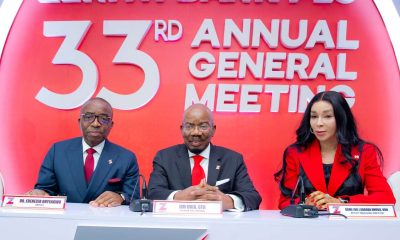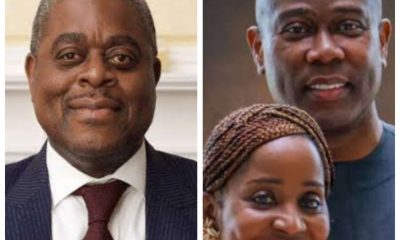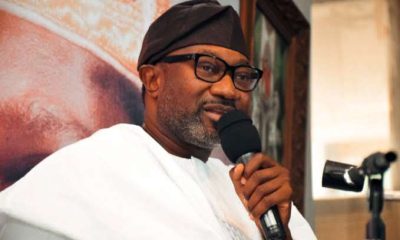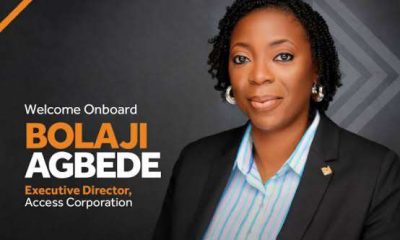Business
Bigwigs unite against Covid-19

By ADEBAYO OBAJEMU, OBINNA EZUGWU & EMEKA EJERE
Except for the Black Death of the 14th Century, no virus in history has shaken humanity to its foundation as Coronavirus, not even the great Influenza of 1918.
But as expected, the fight against this common enemy of humanity is bringing together individuals who have distinguished themselves as dependable “generals” in what may prove to be a long, protracted war against the scourge that is threatening civilisation.
Since the berthing of the virus in the country, the federal and state governments had kept up the pressure against it, with numbers of infected people peaking last week. However, as the week wore on, cream of the banking and manufacturing leading lights gathered together with the encouragement of the Central Bank of Nigeria (CBN) to contribute a landmark one billion each to the fight the scourge.
These peddlers of soft hearts are ironically capitalists, who, in the run of things, are supposed to think of profit, but this time around, they chose to put humanity before gratification, which is why Business Hallmark runs a vignette on them.
HERBERT WIGWE, MD, Access Bank
Herbert Wigwe, last week donated one billion to fight Coronavirus. He is the current managing director of Access Bank, unarguably the largest bank in the country by asset. Suave, debonair and dandyish, he personifies a complete gentleman. He is the second leg of the financial architects that built Access Bank and turned it around to become one of the big five in the country. A dream merchant with an eye for detail and a vision for big things, his binocular is trained to spot opportunities wherever they may be. This talent to connect the unconnected and beat them into seamless beauty is shared by Aig Imoukhuede, his partner, and together they built Access Bank.
In 2002, Wigwe and his business partner, Aigboje Aig-Imoukhuede, saw a unique opportunity and grasped it, acquiring what was then a small commercial bank, Access Bank – at the time, the 65th of the 89 banks in the country.
Access Bank is now one of the top five banks in Nigeria and ranked among the top 500 global banks, according to a 2015 report by The Banker Magazine and is aiming to be Africa’s top bank. It currently serves over 6.5 million account-holders through 350 branches and with more than 1,500 ATMs in major centres across Nigeria, Sub-Saharan Africa and the UK.
It is doubtful if anyone will controvert the fact that Wigwe is one of Nigeria’s foremost corporate bankers, who has helped develop some of Africa’s biggest companies in the construction, telecommunications, energy and oil and gas sectors through a unique model, which involves understanding and providing financial support and expertise. One of the loudest highlights of his achievements as a consummate negotiator and financial whiz kid is the acquisition of Diamond Bank, which is one of the biggest takeovers in the country’s banking history, thus making Access the largest bank. His career in financial services spans more than 25 years including over a decade as Deputy Managing Director.
He succeeded his business partner, Aigboje Aig-Imoukhuede, as managing director of Access in January 2014.
SEGUN AGBAJE, MD, GTBank
Segun Agbaje is on the list of high fliers in the finance and business world who donated one billion each to the worthy cause of fighting the Nigerian variant of the global pandemic last week. Agbaje was one of the thirtyish and under- thirtyish young men who lined up behind Fola Adeola and Tayo Aderinokun in 1988 to conceive the vision that led to the birth of GTBank in 1990.
The bank has distinguished itself, thanks to its efficient service delivery, finesse in across the counter culture and other innovation, a trend of excellence started by the founding fathers but taken a notch higher by the administrative skill and charm of Agbaje.
Analysts of banking in the country continue to ponder the mystery behind the success story of GTB. What are the core competencies that have given this bank an edge over the rest? In 2012, Renaissance Capital (RenCap), a unit of the Russian investment bank controlled by billionaire, Mikhail Prokhorov, with a speciality in emerging markets, in an analytical report titled ‘Battle of Banking Giants’ gave GTB a premium rating.
It backs its view that GTB is a better business that has created tangible cumulative value over some time. “For long-term investors seeking the best-in-class in terms of delivery, we believe GTB is still the best entry point into the Nigerian market.”
This perspective from the Russian mogul is a testament to Agbaje’s abilities to build on the long tradition of efficiency dating back to the bank’s beginning in 1990.
He started his career at Ernst & Young, San Francisco, USA and left in 1991 to join GTBank as a pioneer staff. He rose through the ranks to become an Executive Director in January 2000, and Deputy Managing Director in August 2002. He became managing director in 2011 upon the death of Tayo Aderinokun. He has overseen the expansion of the financial institution to what it has become today.
JIM OVIA, Founder Zenith Bank
Jim Ovia qualifies to be called the godfather of modern banking in Nigeria. In a way, Ovia is an empire builder and as ‘Cecil Rhodes ‘ of the financial empire, he has earned his stripes and epaulettes. Named as one of the financial titans that donated one billion each to Coronavirus cause, this is not strange when one considers his long history of philanthropy. He is the Chairman and pioneer CEO of Zenith Bank PLC, Nigeria’s largest and Africa’s 6th largest bank by Shareholders’ Funds. His skill is variegated and not confined to banking alone but in ICT and other sectors.
In the wake of the deregulation of the banking sector during the administration of General Babangida in the late 1980s, Jim Ovia, together with some investors started Zenith Bank in 1990. He was at the helm of affairs of the bank for 20 years until his resignation in July 2010. He was reappointed the Chairman of the bank in 2014.
Under his watch, Zenith Bank grew and is today recognised as the largest financial service provider in Nigeria and Anglophone West Africa. The bank offers a range of corporate investment, business and personal banking products and solutions. It has over 500 branches and offices across the country, while its headquarters is in Victoria Island, Lagos.
He transformed Zenith Bank, a small commercial bank into a financial service conglomerate. He has built an iconic corporate identity for the bank, leveraging technology and reliable customer services.
ABDUL SAMAD RABIU, Chairman Group
The Chairman of BUA Group of Companies, Abdul Samad Rabiu, has once again gone beyond the precincts of core social responsibility to display milk of his kindness by donating a whopping sum of 1 billion to fight the raging global pandemic that has reached Nigeria. This donation has come through his foundation.
Not too long ago, the visionary mega businessman pledged to construct N7.5 billion 220-bed hospital in Kano.
A statement from the BUA Group said the businessman has also made an order for an ancillary donation of equipment and medical supplies including testing kits and medical protective gear to 9 states in Nigeria.
“These medical supplies are being air freighted and will arrive in Nigeria as soon as possible. States to benefit include Lagos, Kano, Adamawa, Edo, Kwara, Rivers, Abia, Akwa-Ibom and Sokoto.”
Rabiu, while explaining the rationale behind the donation, said it was very important for the private sector to support the government’s effort to curb the spread of the Coronavirus pandemic.
He hinted that the N1billion donation will be routed through the Central Bank of Nigeria-led “Private Sector Coalition Committee against COVID-19”.
“This donation will not only provide additional needed funds to the government and NCDC’s efforts but will also serve to protect healthcare and medical workers on the frontlines of fighting the pandemic.
“In addition to donating the ordered medical supplies and equipment to the two most populated states in Northern and Southern Nigeria, we have also selected 7 states across all geopolitical regions in Nigeria where significant members of the BUA workforce and their families are situated to help preparedness and response to the challenges posed by the pandemic. Each of these 9 states will receive about 100,000 protective facemasks, 1000 high-grade medical protection and isolation gear, 2000 protective goggles, 1000 gloves and 1000 testing kits amongst other things,” Rabiu said.
Rabiu is an investor born to run on the business highways. He has had a long history of philanthropy, thus when he donated one billion to fight the dreaded Coronavirus, it was no surprise. He has managed to build his empire on cement manufacturing, and he has achieved this with his image intact, which is much of a surprise given the murky waters of business in Nigeria.
Abdul Samad Rabiu established BUA International Limited in 1988 for the sole purpose of commodity trading. The company imported rice, edible oil, flour, and iron and steel.
In 1990, the government, which owned Delta Steel Company, contracted BUA to supply its raw materials in exchange for finished products. This provided the much-needed windfall for the young company. BUA expanded further into steel, producing billets, importing iron ore, and constructing multiple rolling mills in Nigeria.
A few years later, BUA acquired Nigerian Oil Mills Limited, the largest edible oil processing company in Nigeria. In 2005 BUA started two flour-milling plants, in Lagos and Kano. By 2008, BUA had broken an eight-year monopoly in the Nigerian sugar industry by commissioning the second-largest sugar refinery in sub-Saharan Africa. In 2009 the company went on to acquire a controlling stake in publicly-listed Cement Company in Northern Nigeria and began to construct a $900 million cement plant in Edo State, completing it in early 2015. All this achievement owes much to his business acumen, integrity and determination.
His late father, Khalifah Isyaku Rabiu, was one of Nigeria’s foremost industrialists in the 70s and 80s.
Rabiu uses the BUA Foundation for his philanthropic activities. These include the construction of a 7,000-square-meter pediatric ward at the Aminu Kano Teaching Hospital and the construction of the Centre for Islamic Studies at Bayero University Kano, amongst other gestures.
TONY ELUMELU, Group Chairman, UBA
Mr Tony Elumelu, Group Chairman, United Bank for Africa (UBA) is one of the Nigerian billionaires that have supported the government in its battle against the COVID-19 pandemic.
When fourteen years ago, Elumelu in a sudden burst of audacity, engineered the emergence of the new UBA and launched its ambitious Pan-African drive, many were not enamoured and remained quite sceptical. But with its latest results showing the international operations grossing 46% of revenues, Elumelu has proven all doubting Thomases wrong.
The sterling performance of the bank in the international market as one of Africa’s leading lenders has been impressive. Its consistent promotion of financial inclusion across the African market can be rightly argued to be the catalyst in the emergence of the African free trade agreement (AFCFTA).
Its successes in creating innovative financial products which broaden the traditional financial base are also widely noted. The UBA Market Place event which held last year in Abuja set new industry benchmarks
The institution has become much more than a bank. Increasingly, it is emerging as a totem of the new Africa; a resurgent continent of dynamic men and women poised to position the old continent at the centre of the new world order, even as the fourth industrial revolution dawns.
On Thursday, March 24, the UBA Foundation, the philanthropic arm of the pan African bank, announced a donation of over N5 billion (USD14 million), to assist Nigeria and other African countries in the battle against the Coronavirus pandemic.
Elumelu, who announced the donation, noted that the idea is to provide significant and much-needed support to Nigeria and 19 other African countries by supplying relief materials, critical care facilities, and financial support to Governments.
“This is a time when we must all play our part. This global pandemic must bring citizens, governments and business leaders together – and quickly.
“As we see a rapidly increasing number of cases of the coronavirus in Nigeria and Africa, the private sector has to work hand in hand with various Governments, in stemming the spread of the global pandemic,” Elumelu said.
ALIKO DANGOTE, President Dangote Group
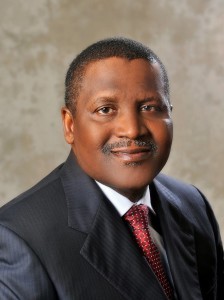 Alhaji Aliko Dangote, President of Dangote Group, is one of the billionaires that have supported the government in its battle against the COVID-19 pandemic.
Alhaji Aliko Dangote, President of Dangote Group, is one of the billionaires that have supported the government in its battle against the COVID-19 pandemic.
Dangote, undoubtedly, is a household name in Nigeria, the country of his birth, and the continent of Africa, where he is impacting greatly, and beyond. Whether it is a quest for food or shelter – two of humanity’s basic needs – there is hardly any escaping Dangote products in one’s daily life.
As the continent’s richest man it is not by any means out of the ordinary that his name is mostly associated with wealth. But perhaps not more than a few people are aware that as deep as his pockets are, Dangote’s heart is even bigger. He is, as statistics have proven, the continent’s most generous individual.
Rich, yet very gentle and down to earth. If there are anything Dangote values more than his determination to keep succeeding, it is friendship. Be it a birthday party, marriage ceremony, burial event, as long as he gets an invitation, Dangote often finds time to attend. But of course, his life does not revolve around his friends.
In a clime where being rich often goes with a bit of arrogance, the Kano-born, Lagos-based billionaire changes one’s mental picture of an ideal “big man.” Often in his simple native attire, and wearing his trademark smile, Dangote betrays such affection for humanity that immediately overwhelms those around him.
It is indeed, a humanity that he has continued to dedicate himself and his wealth to serving. Be it in the nation’s North East beset by Boko Haram insurgency, or t anywhere there is a need to assist the downtrodden, he never shied away. And now he has even bigger plans to “give a chunk of my wealth to charity in the next few years.”
Dangote has continued to use his wealth to assist those in need, albeit mostly silently. Through his foundation, the Aliko Dangote Foundation (ADF), to which he has donated over $1.2 billion, and which he says is dedicated to “reducing the number of lives lost to malnutrition and disease,” he has continued to touch lives in very unique ways.
“Combating Severe Acute Malnutrition (SAM) in children is at the core of our programming. Improving the outcome of children’s lives forms the basis for the work the foundation is engaged in, using our investments in health, education, and economic empowerment to help lift people out of poverty,” he says.
The foundation is the Corporate Social Responsibility arm of the Dangote Group. It is responsible for contributing hundreds of billions of naira in charitable funds to several causes in Nigeria and Africa over the past few years. And the gesture has continued.
Last week, the foundation pledged a sum of N200 million to support Nigerian government’s effort to curb the spread of the novel coronavirus in the country, a donation considered as the largest single donation by a corporate organization towards eradicating the deadly disease.
“The donation was part of the foundation’s cardinal objective of partnering with governments at all levels against the dreaded disease in Nigeria and the rest of Africa,” ADF Managing Director and Chief Executive Officer, Ms Zouera Youssoufou, noted
As if that was not enough, Dangote subsequently joined a group of Nigerian billionaires who donated the sum of N1 billion each to support the government in its battle against the COVID-19 pandemic.
FEMI OTEDOLA, businessman
Mr Femi Otedola, businessman, philanthropist, and former chairman of Forte Oil Plc is one of the Nigerian billionaires that have supported the government in its battle against the COVID-19 pandemic.
A self-effacing businessman who prefers to tread the quiet side of life, Otedola walks the business promenade with less noise, skirting the fringes of the limelight, while naturally avoiding its hug. He has made good for himself as a businessman, making him one of Africa’s richest.
Much as he loves to walk the lonely path undisturbed by paparazzi, he has not been able to wade off the burden of success, which most often, comes with some controversy, borne of variables that accompany successful people.
Thus, in 2012, Femi Otedola was reported by the media to have given bribe to Boniface Emenalo and Farouk Lawan, who was then, the Chairman of the House Committee on Fuel Subsidy Regime, a sum of $620,000.
The reason reported by witnesses for the actions of Femi Otedola was that he wanted the name of his company removed from the list of firms indicted by Farouk Lawan’s committee for abusing the fuel subsidy regime in 2012. Farouk Lawan and Boniface Emenalo were at risk of going to prison if found guilty of receiving money from Femi Otedola as receiving of a bribe by a government official is an offence punishable by imprisonment.
On February 2, 2013, both Farouk Lawan and Boniface Emenalo were charged to court by the Independent Corrupt Practices and another related Commission (ICPC) and their trial were at the Federal Capital Territory High Court in Abuja for bribery, an offence that violates Section 10 (a) (ii) of ICPC Act, 2000 and punishable under Section 10 of that same Act.
Farouk Lawan pleaded not guilty and initially so did Boniface Emenalo. However, events at the court of law took an unforeseen turn as Boniface Emenalo eventually admitted he was guilty and had received several bribes on behalf of Farouk Lawan. Be that as it may, new evidence provided by the prosecution was very concrete as Lawan was caught red-handed in a video recording receiving money from Otedola.
It subsequently emerged that Otedola had previously reported Lawan’s harassment and demands for bribes to the State Security Services, which had orchestrated a sting operation. Lawan was charged with corruption in February 2013.
Over the years, Otedola has displayed the palpable humanitarian streak in him, and in this way has touched many lives. He has been involved in several commendable interventions for ailing former Nigerian international players, including 1980 AFCON winning team – Captain Christian Chukwu and goalkeeper Peter Fregene. He also reportedly took up the medical expenses of ailing Nollywood actor, Sadiq Daba, among other acts of philanthropy.
Otedola has made several donations to the Michael Otedola University Scholarship Scheme, which was established in 1985 to give underprivileged students in Lagos State access to higher education.
In 2005 Zenon donated N200 million to the scheme’s fund. Since its inception, the scheme has benefited more than 1,000 students. It, therefore, did not come as a surprise last week when the business tycoon, via his official twitter handle, @realFemiOtedola, announced he will be donating the sum of N1 billion to help in the battle of the novel Coronavirus pandemic.











